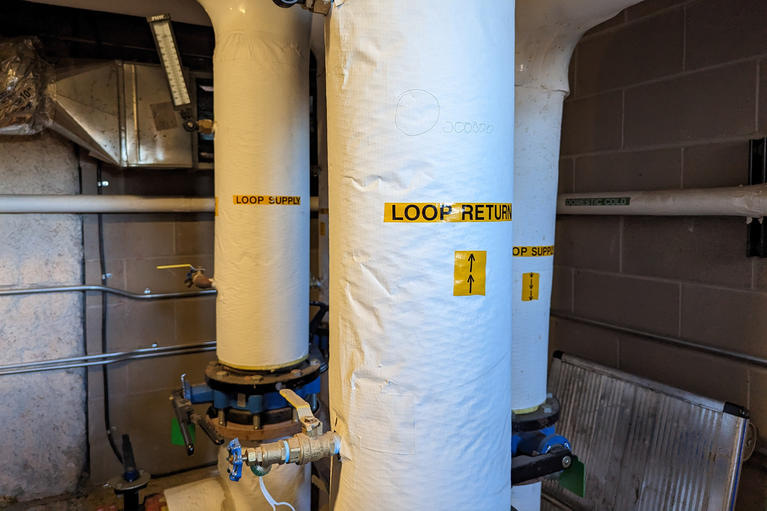
Geothermal Energy Tax Credit Offering
Colorado Geothermal Energy Tax Credit Offering
A financial incentive for business and government entities to develop, produce, and use geothermal energy.
Funding Overview:
Eligibility: Private Entities, Local Governments, Public-Private Partnerships
Type: Tax Credit (merit-based, refundable)
Amount:
- Up to 30% of investment cost for Investment Tax Credit (ITC); may award up to 50% for select projects (not to exceed $5 million/project)
- $0.02/kWh for Production Tax Credit (PTC); CEO may modify amount on an annual basis
Match: Varies
Program Length: Until funding is expended, or until December 31, 2032
Application cycle: Semi-annual, closing on June 30 and December 31 of each year. CEO is not currently accepting applications.
The Colorado Energy Office (CEO) will provide refundable, merit-based tax credits to support eligible geothermal projects in Colorado, including developing and producing geothermal electricity, installing a thermal energy network, or conducting a thermal energy network study. CEO will award the Geothermal Energy Tax Credit Offering (GETCO) through a competitive process, providing a total of $35 million in state investment tax credits (ITC). A production tax credit (PTC) is also available for electricity production.
What is a refundable tax credit? A refundable tax credit is a credit you can receive as a refund or repayment on your taxes if the credit amount is more than the amount of taxes you owe. Eligible entities without a tax liability will receive repayment with a tax filing.
For more information on the GETCO, please contact ceo_geothermal@state.co.us.
Sign up to Receive Updates about the Colorado Geothermal Program
Informational Webinar and Q&A
CEO hosted an Informational Webinar about the fourth application cycle.
Watch the webinar
View Cycle 4 GETCO Q&A responses
Responses from other previous application cycles are available for reference below. Information from previous application cycles is subject to change for current and future application cycles.
View previous GETCO Q&A responses
See the How to Apply section below for more information.
Eligible Applicants
The following applicant types are eligible for this funding opportunity. More detailed definitions of each applicant type are available in the application materials linked in the How to Apply section.
- Building owners
- Campuses
- Developers
- Local governments
- Tribal governments
- Geothermal contractors
- Corporations (including universities and other academic institutions)
- Gas or electric public service utilities
- Public-Private partnerships
Tax-exempt institutions can realize this refundable state tax credit, as applicable, by providing their assigned Federal Employer Identification Number (FEIN).
Eligible Projects
Colorado Geothermal Investment Tax Credit (ITC)
Applicants developing a geothermal energy project may apply for an ITC. The ITC will offset up to 30% of investment costs, not to exceed $5 million per project. If awarded, the Tax Credit certificate is reserved over a three year period. Projects must focus on evaluating and developing a geothermal resource to produce electricity or a thermal energy network, including:
- The exploration and development of wells
- Drilling exploration and confirmation wells
- Production of electricity using heat from oil and gas operations, as long as the electricity is utilized to reduce on-site emissions and the project would not otherwise be economically feasible as a geothermal energy project
- Drilling injection wells
- Flow testing
- Reservoir engineering
- Coproduction of geothermal energy, including for industrial uses or thermal energy networks
- Power generation equipment
- Studies to identify and explore resources that may be suitable for geothermal electricity generation and may include hydrogen generation or utilization of direct air capture technology
- Thermal energy network study, which can include an energy and emissions scoping study, a feasibility study, an investment grade energy audit, a detailed engineering design, or a combination of these options that meets or exceeds CEO standards
- Construction and installation of a thermal energy network
Please Note: On a case-by-case basis, CEO may increase the awarded ITC amount to up to 50% for projects that have significant potential to result in geothermal electricity production or demonstrate the use of geothermal energy to advance electricity production capabilities in Colorado.
Colorado Geothermal Production Tax Credit (PTC)
Applicants who produce electricity from geothermal energy, for sale or for their own use, may receive a refundable tax credit based on the amount of electricity produced. There is no limit on how much an applicant can be awarded. The Tax Credit certificate is reserved over a three year period. The PTC offers $0.02/kWh of electricity generated.
Qualified geothermal electricity power facilities include:
- Conventional Hydrothermal Systems (CHS)
- Advanced Geothermal Systems (AGS)
- Enhanced Geothermal Systems (EGS)
- Supercritical Hot Rock (SHR)
- Geothermal power plants with synergistic technologies (e.g. thermal energy networks, hydrogen production, direct-air capture)
- Coproduction of geothermal energy
- Hybrid or energy systems that generate electricity from a geothermal production well, including but not limited to:
- Geothermal and Solar
- Geothermal and Wind
- Green Hydrogen Production
Please Note: Awarded applicants may only use the tax credit for approved geothermal energy projects that start on or after January 1, 2024 and are complete by January 1, 2033.
How to Apply
Geothermal Energy Tax Credit Offering
Interested parties can find the previous cycle's application materials, including Standards and Guidelines, Application questions, and required supporting attachments, for reference in the folder linked under ‘Step 1’ below.
If you have issues accessing the application materials, please reach out to ceo_geothermal@state.co.us.

Download and review all the Application Materials and the appropriate GETCO Standards & Guidelines.
View Application Materials

Submit the application online through the GETCO application portal. Be sure to include all required attachments.
CEO is not currently accepting applications.

CEO will review applications for eligibility and technical feasibility, then an evaluation committee will score applications based on predefined selection criteria.

CEO will announce awards and enter a formal Tax Credit Agreement with awardee outlining terms and conditions to receive the tax credit.

CEO will provide a tax credit certificate for the awardee to file with the Colorado Department of Revenue (DOR) during their tax filing period.

DOR reduces tax liability for tax year and amount outlined in Tax Credit Agreement, refunding any remaining amount as applicable.
